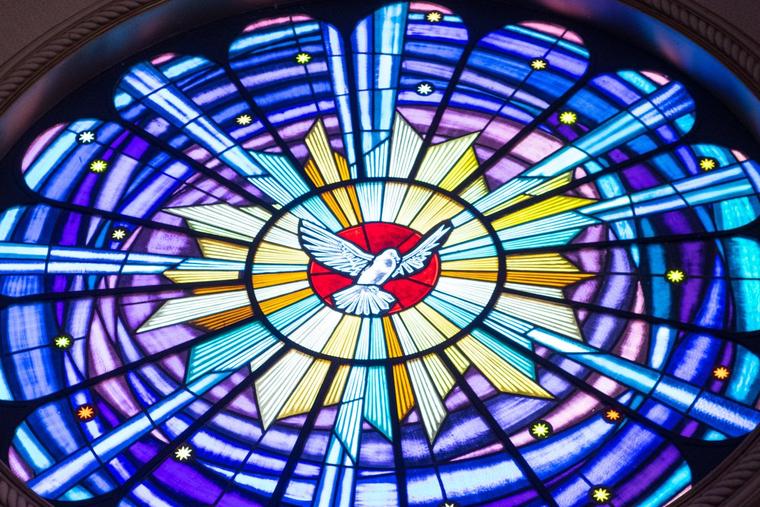Happy in the Spirit: Follow in the Footsteps of St. Philip Neri
SACRAMENTAL LIVING: CONFIRMATION

The Catechism of the Catholic Church describes how confirmation “gives us a special strength of the Holy Spirit to spread and defend the faith by word and action as true witnesses of Christ, to confess the name of Christ boldly, and never to be ashamed of the Cross” (1303). Looking at St. Philip Neri, we see the Spirit richly dwelling in him as he embodied these characteristics through his life. Let’s use St. Philip as a model as we strive to utilize the graces dispensed to us at confirmation, guided by these lines from the Catechism.
St. Philip made the idea of “living in the Spirit” deeply human. Witty in his encounters, devoted in hearing confessions, and beloved for his lightheartedness, Philip became known as the “Apostle of Rome.” He witnessed the fact that living in the Spirit doesn’t change who we are. Rather, it makes us become more of who we are.
Philip was magnetic. People were attracted to his pleasant personality and depth of character, and those of all walks of life found themselves enraptured by the way he spoke and lived his faith.
Spending hours in the streets of Rome, Philip ached for its conversion and felt called to evangelize. Docile to the Spirit and keenly in tune with human nature, he invited Romans to gather every evening. His purpose was to offer them an alternative to the debaucherous activities they might otherwise be engaged in. What started out small grew into such a large group that they needed to build a new meeting space. Eventually, they built a loft above a church that became known as the Oratory, the “place of prayer.”
This would become one of Philip’s great legacies. As we cultivate the gifts we are given at confirmation, we, like Philip, become true witnesses of Christ even on the most “normal” of days. These gifts naturally draw others to us and allow us to participate in the mission of evangelization. Philip said it with profound simplicity: “The name of Jesus, pronounced with reverence and affection, has a kind of power to soften the heart.” He knew this well and made sure to speak the name of Jesus often.
What people loved about Philip was that he wasn’t just speaking about Jesus. Rather, he proclaimed Jesus with his whole life. Wandering the city with his dog, pulling a practical joke and gathering friends around a table to pray and chat, St. Philip lived with the fullness of the Spirit. People were eager to know where his fervor came from and wanted it for themselves.
Philip had a zeal for Christ that made holiness as attractive as it was attainable. His sainthood was, in many ways, simple. He gives us the rubric to proclaim Christ’s name boldly in our workplaces, our homes, our Church and beyond.
St. Philip wrote, “He who runs away from one cross will meet a bigger one on his road.” He understood that the cross was the surest way to sanctity, but he also knew living under the cross was no cakewalk. Though Philip would become the patron saint of laughter, he visited the topic of the cross frequently. He said, “Spiritual persons ought to be equally ready to experience sweetness and consolation in the things of God, or to suffer and keep their ground in drynesses of spirit and devotion, and for as long as God pleases, without their making any complaint about it.”
Seeking to live the sacrament of confirmation like St. Philip, let us recall the truth of his words and never be ashamed of the cross, our only hope. Seeking to embrace it rather than run, let us focus on our eternal goal, just as Philip did. And let’s do it with good spirits!
In a message delivered on the fifth centenary of St. Philip Neri’s birthday, Pope Francis spoke of this great saint, saying, “his mission as ‘chiseler of souls’ was certainly helped by the unique attractive force of his person, distinguished by human warmth, joy, meekness and gentleness. These particular attributes of his originated in the ardent experience of Christ and in the action of the Divine Spirit who expanded his heart.”
As the Catholic Encyclopedia explains, “A few days before Pentecost in 1544, the well-known miracle of his heart took place. Bacci describes it thus: ‘While he was with the greatest earnestness asking of the Holy Ghost His gifts, there appeared to him a globe of fire, which entered into his mouth and lodged in his breast; and thereupon he was suddenly surprised with such a fire of love, that, unable to bear it, he threw himself on the ground ... and [w]hen he had remained so for some time, and was a little recovered, he rose up full of unwonted joy ... and putting his hand to his bosom, he felt by the side of his heart a swelling about as big as a man’s fist, but neither then nor afterwards was it attended with the slightest pain or wound.’”
Doctors discovered after Philip died, “The saint’s heart had been dilated under the sudden impulse of love.”
In the footsteps of St. Philip, may we become more full-hearted, Spirit-filled versions of ourselves as we proclaim Christ to the world.















